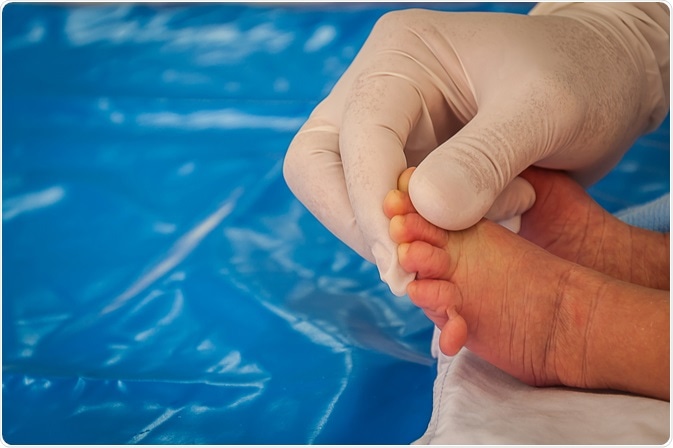Patau’s Syndrome is also known as Trisomy 13. It is a chromosome-based, rare genetic disorder in which the patient has an extra copy of chromosome 13 in some or all of the cells in the body. Normally the baby should have two copies of the chromosome but in this case, there are three. The presence of the extra chromosome causes abnormal development of the fetus, often resulting in a miscarriage or stillbirth.
The chances of survival of a baby with Patau’s syndrome are minimal. One in sixteen thousand are affected by the syndrome. Around 90% of babies born with Trisomy 13 will not survive beyond their first birthday. Many are born with such severe medical conditions that they die within a week after being born. The 10% of babies born with a less severe form of Patau’s Syndrome may live longer but will be afflicted with a range of health issues.

Image Credit: Arnon Thongkonghan / Shutterstock
Symptoms of Patau’s Syndrome
Due to the presence of the extra chromosome 13 in the body’s cells, the proper development of the baby is impossible. Some possible symptoms of a baby born with this genetic disorder include:
- Congenital heart defects
- Brain and spinal cord abnormalities
- Microcephaly or head size is smaller than normal
- Micrognathia or smaller lower jaw size than normal
- Cutis Aplasia or missing skin on the scalp
- Deformation of ears accompanied with deafness
- Microphthalmia or poorly developed eyes
- Anophthalmia or absence of one or both eyes
- Coloboma or hole, split or cleft in the iris
- Polydactyly or extra toes or fingers may be present
- Nasal passages may not be properly developed
- Cleft lip or an opening in the lip
- Cleft palate of an opening in the roof of the mouth
- Hypotonia or weak muscle tone
- Rounded bottom to the feet also known as rocker-bottom feet
- Capillary Haemangiomas or raised red birthmarks
- Exomphalos or intestines found outside the body in a sac of membrane
- Hernias such as umbilical hernia or inguinal hernia
- Cysts in the Kidneys
- Intellectual disability
- Skeletal abnormalities in the limbs
Not all babies born with Patau’s syndrome will display all these symptoms. However, they will have many of the symptoms mentioned in the list leading to medical health issues.
Patau's and Edward's Syndrome - CRASH! Medical Review Series
Cause and Diagnosis
The extra copy of chromosome 13 is generated by random events. The formation of the eggs or sperm may show translocation of this chromosome which causes trisomy 13. This is a condition that may be inherited or may occur randomly during conception. There is nothing that the parents can do to avoid this abnormal development. Statistically speaking, the older the woman is at the time of conception, the more likely there is to be a genetic problem with the fetus. This is why women are advised to conceive before they reach the age of thirty. The condition of their eggs is not as robust as they age.
The diagnosis of a genetic disorder is done by screening the pregnant woman at 10 to 14 weeks. The combined test will check for Down’s syndrome, Edward’s syndrome and Patau’s syndrome. It involves a blood test combined with an ultrasound scan. If the fetus is found to be at risk, additional tests may be done by using a sample of cells from the fetus. People with a family history of trisomy 13 should opt for the tests.
The two ways to get fetal cells are amniocentesis and chorionic villus sampling. In amniocentesis, a sample of the amniotic fluid is removed from the womb as it tends to contain the cells shed by the developing fetus. In chorionic villus sampling cells will be taken from the placenta which links the blood supply of the mother to the developing fetus. Both tests are highly invasive and include a risk of miscarriage.
Treatment
There is no definitive treatment for Patau’s syndrome. As it cannot be cured, the treatment is usually based on the symptoms that ail the baby. The aim of the medical staff at the hospital is to minimize the discomfort of the baby and ensure that it is able to feed. Very often, the baby will be unable to respond to normal stimuli due to its abnormal development.
The care of the baby includes counseling the parents about what to expect. A support system is essential to help the new parents deal with the stark reality of the fact that their baby is not going to live beyond a year if it makes it past the first week in the hospital. It can be an emotionally traumatic experience for the parents.
Further Reading
Last Updated: Mar 11, 2021